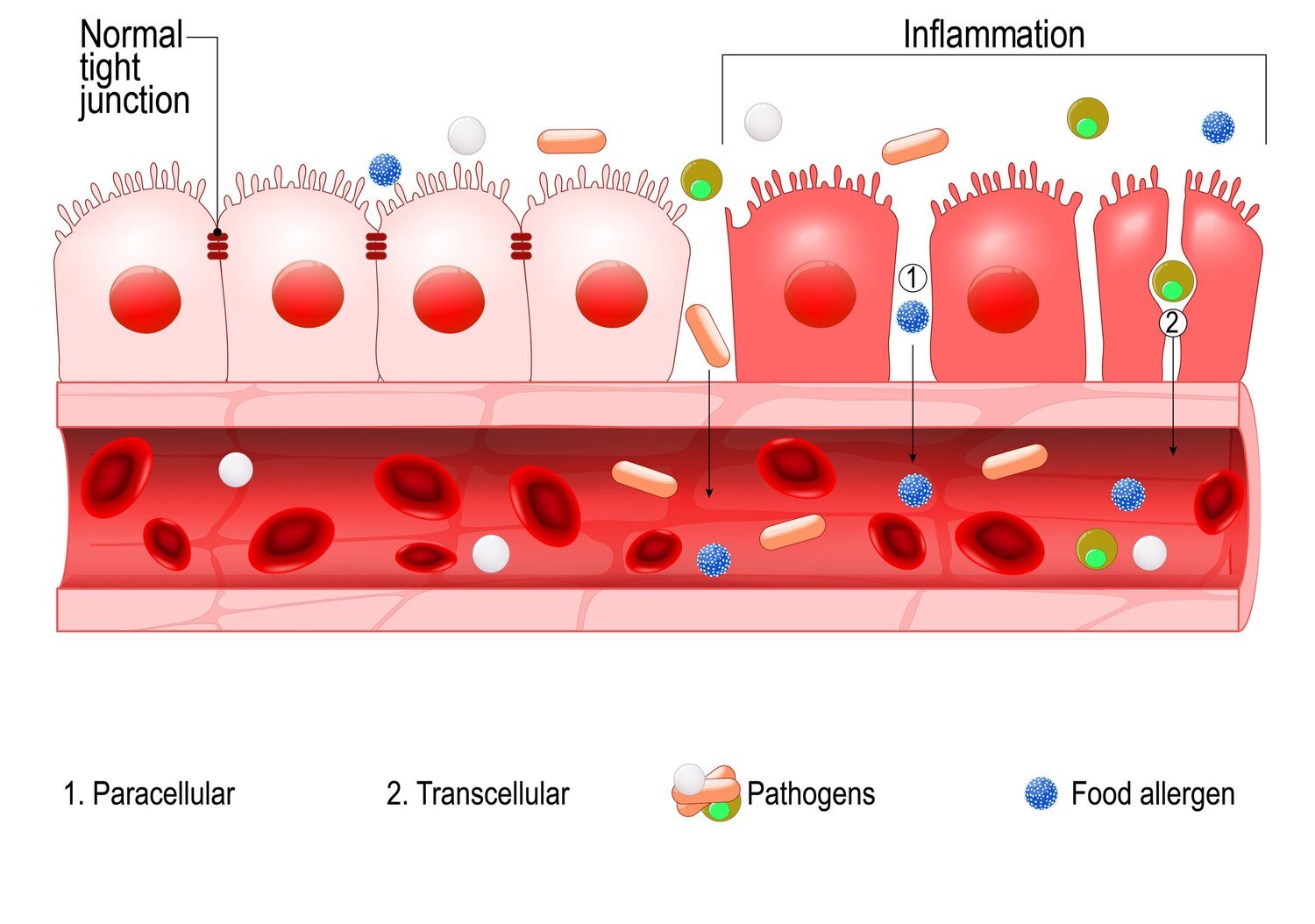Test Don't Guess
I am all about finding the root cause to our health issues. Today we are fortunate enough to have specific and accurate forms of testing. Testing is an effective tool to pinpoint what is going on with your body. Health issues typically begin in the gut. Our immunity resides there - about 80-90% of it! So, it’s logical to “look under the hood” so to speak. Gut issues may cause:
Leaky Gut Permeability (Intestinal Permeability)
Skin issues like acne, psoriasis and eczema
Mood disorders
Nutrient/Mineral Deficiencies
Hormonal Imbalances
Achy joints
Insomnia
Fatigue
Acid Reflux
Bloating
Diarrhea/Constipatioin
IBS
Autoimmune conditions
Food sensitivities
SIBO/SIFO (Small Intestinal Bacterial Overgrowth and Small Intestinal Fungal Overgrowth)
Just to name a few, right? But here is the thing - our gut lining is only one-cell thick! This is good news in that our nutrients can easily be absorbed - bad news because if our gut is damaged, many health symptoms may arise. The lining in our small intestine is where nutrient absorption takes place. Our lining protects what enters into the bloodstream by tight junctions. If the wrong things enter in the body, our immune system gets activated and produces inflammation in the body.
Factors that affect our tight junctions include: gluten exposure, glyphosate (RoundUp), nutrient deficiencies and bacterial, viral, parasitic and fungal infections. Our body absorbs the undigested proteins, environmental toxins, bugs and the toxins these bugs produce. This is commonly referred to as “leaky gut” and we are left with a plethora of symptoms. While this may seem overwhelming, there are accurate stool tests (DNA sensitive), nutrient testing and food intolerance tests that can pinpoint the cause of your unique digestive and health issues.
LEAKY GUT
Using the knowledge received from testing can not only help you physically, but may improve your mental health as well. Scientists have found that gut bacteria produce neurotransmitters such as serotonin, dopamine and GABA, all of which play a key role in mood. For example, 80% of our serotonin, the“feel good neurotransmitter” is produced in the gut.
Another example is H.pylori, a common bacterial infection that causes inflammation in the stomach. It is a common cause for ulcers and is found in fifty percent of the world’s population. It can weaken your production of hydrochloric acid which aids in the absorption of certain nutrients such as protein and B12. Hydrochloric acid also kills pathogenic bacteria and viruses so not having enough may enable additional gut infections to take place. A stool test can detect it amongst other infections and then treatment can be specifically targeted.
Knowing exactly what is causing your symptoms will save you time and money in the long run. Having a supplement graveyard and chasing symptoms with a “pill for an ill” approach is like throwing darts on a board and hoping you hit the bullseye.
Are You A “Sugar Sensitive” Person?
“IT’S NOT JUST A MATTER OF WILLPOWER”
Why sugar acts like a drug.
I am sure many of you know that eating sugar is not good for your health. Not only does eating sugar, white flours and processed carbs spike our blood sugar, but the foods that contain a lot of it are nutrient-poor, fiber-stripped and inferior in quality. There are people, however, that are more sensitive to carbohydrates than others and have a more powerful blood sugar response to eating them. Because of this, they have a hard time quitting sugar or alcohol and are known as “sugar sensitive”.
According to Kathleen Des Maisons, the author of Potatoes Not Prozac, a certain percentage of our population is “sugar sensitive”. She has discovered how people with normal chemistries experience the opioid effects of sugar or alcohol as pleasant. However, for “sugar-sensitive people”, the euphoria from eating sugar or drinking alcohol can create “a strong attachment to the food or drink creating the effect”. “Sugar-sensitive” people naturally have low levels of beta-endorphins, a neurotransmitter that is a potent pain suppressant. Their brains adjust by opening many beta-endorphin receptors to “catch” what little beta-endorphin there is. So when they eat sugar or drink alcohol, they have a heightened response to these substances and in turn cause a release of beta-endorphin. Sugar and alcohol make them feel really good but because of this, are more prone to addiction. Being physically dependent on these foods result in huge mood boosts but the after effects result in depression, anxiety and exhaustion.
When “sugar sensitive” people try to avoid sugar and or alcohol, they feel terrible and hopeless. Thus, the desire to continue on the sugar rollercoaster continues. If they give in and consume it, it is hard for them to “just say no” after having one taste. Once people do try to quit sugar or alcohol, the brain will open up more beta-endorphin receptors to compensate for the reduction of beta-endorphins. Because more are open, consuming sugar or alcohol can send out a more intense response. This can create a feeling of euphoria and they slip back into sugar and alcohol consumption.
Revamping the way a sugar-sensitive person eats will help their brain chemistry come into balance. Understanding your own physiology along with correcting nutritional deficiencies can get you off the sugar/alcohol rollercoaster. It’s not just a matter of willpower.
Besides nutritional changes, other ways to increase beta-endorphins include exercise, music, sex, laughter, meditation and prayer.
Rethinking your coffee maker.
Hmmm. I love the smell of coffee first thing in the morning. But drinking coffee from a brewer that releases hot water through a plastic filter releases chemicals that act like estrogen in the body. And the last thing I need being that I am prone to being estrogen dominant and recovering from estrogen-receptor positive breast cancer are more chemicals that mimic estrogen in my body.
Hmmm. I love the smell of coffee first thing in the morning. But drinking coffee from a brewer that releases hot water through a plastic filter releases chemicals that act like estrogen in the body. And the last thing I need being that I am prone to being estrogen dominant and recovering from estrogen-receptor positive breast cancer are more chemicals that mimic estrogen in my body.
We can either produce too much estrogen on our own due to genetics, liver congestion or we can acquire it from our own environment or diet. In today’s modern world, hormones are added to foods, especially beef and dairy. They are present in pesticides, herbicides, plastics and even cosmetics.
Estrogen and progesterone need to be in balance for achieving optimal health. When xenoestrogens (foreign estrogens) enter the body, they increase the total amount of estrogen resulting in estrogen dominance. Estrogen dominance symptoms include: Irregular and heavy periods, weight gain, fibroids/endometriosis, fibrocystic breasts, insomnia, depression/anxiety/irritability, low libido and fatigue. So what does this have to do with coffee?
Well for many years, I began eating hormone-free foods, tossing out personal care products and home-cleaning supplies that were toxic and were known to be endocrine (hormone) disruptors. But I completely overlooked my coffee maker. I do love one hot steaming cup of organic coffee in the morning. I love the rich flavors from a freshly brewed cup and living in Minnesota, a warm cup of anything is almost a necessity.
In addition, when I went to a coffee house, I never thought about drinking through the plastic lid. Now at the counter, I ask them to hold the lid.
A good first step to minimizing xenoestrogens is to change my morning ritual. I researched coffee makers and found the Chemex coffee maker to be my favorite. Not only is it beautiful in design, the coffee only comes in contact with a non-bleached filter and non-porous glass. Besides being elegant, it produces a rich-tasting cup of coffee without bitterness and sediment. Once the pot is brewed, the grounds can easily be tossed out.
Other products I have used are Italian espresso makers and the French Press. They are made of stainless steel and glass respectively so they are great choices to avoid heated plastics. Personally I enjoy the taste of the coffee from my Chemex better and best of all, cleaning up the grounds is a lot easier when it is all contained in the filter.
I will be discussing step-by-step how to replace and or purchase products that will help you in your quest to balance your hormones. Since many of us drink coffee, working on replacing this habit will begin your journey to minimizing xenoestrogens. And at your favorite coffee shop, tell them to hold the lid.









